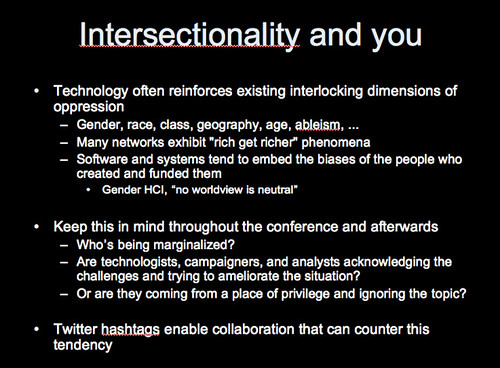 According to new data from the Bureau of Labor Statistics, in 2007 the ratio of women’s and men’s median annual earnings reached almost 78 cents on the dollar for full-time year-round workers, up from just under 77 cents in 2006. This is the narrowest the wage gap has ever been, but it’s only an additional one cent on the dollar. One cent is chump change. It isn’t real change.
According to new data from the Bureau of Labor Statistics, in 2007 the ratio of women’s and men’s median annual earnings reached almost 78 cents on the dollar for full-time year-round workers, up from just under 77 cents in 2006. This is the narrowest the wage gap has ever been, but it’s only an additional one cent on the dollar. One cent is chump change. It isn’t real change.
— from AAUW’s Equal Pay Day, April 28
African-American women earn 62¢ and Latinas earn 53¢ for every dollar earned by white, non-Hispanic men. #fairpay #fem2 #p2
— @NWLC on Twitter
One of President Obama’s first actions in late January was signing the Lilly Ledbetter Fair Pay Act into law. That’s only a first step, though; the next battle in the fight against wage discrimination is the Paycheck Fairness Act. The PFA updates the 45-year-old Equal Pay Act in many important ways, and passed the House with strong bipartisan support, and is currently before the Senate as S.182.
The AAUW’s site has a bunch of ways you can help: call your Senators, wear red,* blog about it, share on Facebook and join their group and cause, and tweet about it using the #fairpay hashtag. It’s all important; do as much as you can. There are a couple of things I’d specifically like to highlight.
Let’s start with Twitter, where this is another great opportunity for hashtag-based diversity activism. Activity via #fairpay accomplishes several things. Most obviously, it raises awareness: whenever you tweet, all your followers are reminded of the wage gap. If some of the Twitterati start retweeting, or there’s enough activity that #fairpay winds up in the top 10 “trending” hashtags, a lot more people will see it. So tweet away! If you’re not sure what to say, the National Women’s Law Center has some tweeting points you can use as inspiration.
Continue Reading »
Twitter is an opportunity to engage with communities currently marginalized by the “progressive blogosphere”





